Medium has established itself as a go-to platform for writers and businesses, offering a clean interface and a built-in audience. However, its "one-size-fits-all" model, shifting partner program, and limited customization can be restrictive. For Omaha-based businesses, digital publishers, and tech startups seeking greater control over branding, content ownership, and revenue streams, exploring medium alternatives is a strategic necessity. The right platform can offer superior SEO capabilities, direct newsletter integration, or more favorable monetization options.
This comprehensive guide moves beyond surface-level comparisons. We provide an in-depth analysis of 12 distinct platforms, from newsletter-focused Substack to the developer-centric DEV Community. Each profile includes:
- Key Features & Pricing: A clear breakdown of what each platform offers.
- Pros & Cons: An honest assessment of strengths and limitations based on real use cases.
- Ideal User: Pinpointing who benefits most from each service.
- Screenshots & Direct Links: Visual references and easy access to explore further.
A key motivator for exploring alternatives is often the desire for better earning potential. If you're looking to maximize your revenue, learning how to monetize your content effectively across different platforms is a crucial first step. Our goal is to equip you with the detailed information needed to select a publishing home that aligns perfectly with your business objectives, whether that's boosting organic traffic, building a loyal community, or scaling a content-driven enterprise.
1. Substack
Substack is one of the most prominent Medium alternatives for writers focused on building a direct, monetizable relationship with their audience. It excels by merging a simple blogging interface with a powerful email newsletter system. This combination allows you to publish content that lives on your publication's webpage and is simultaneously delivered directly to your subscribers' inboxes, fostering a loyal community.
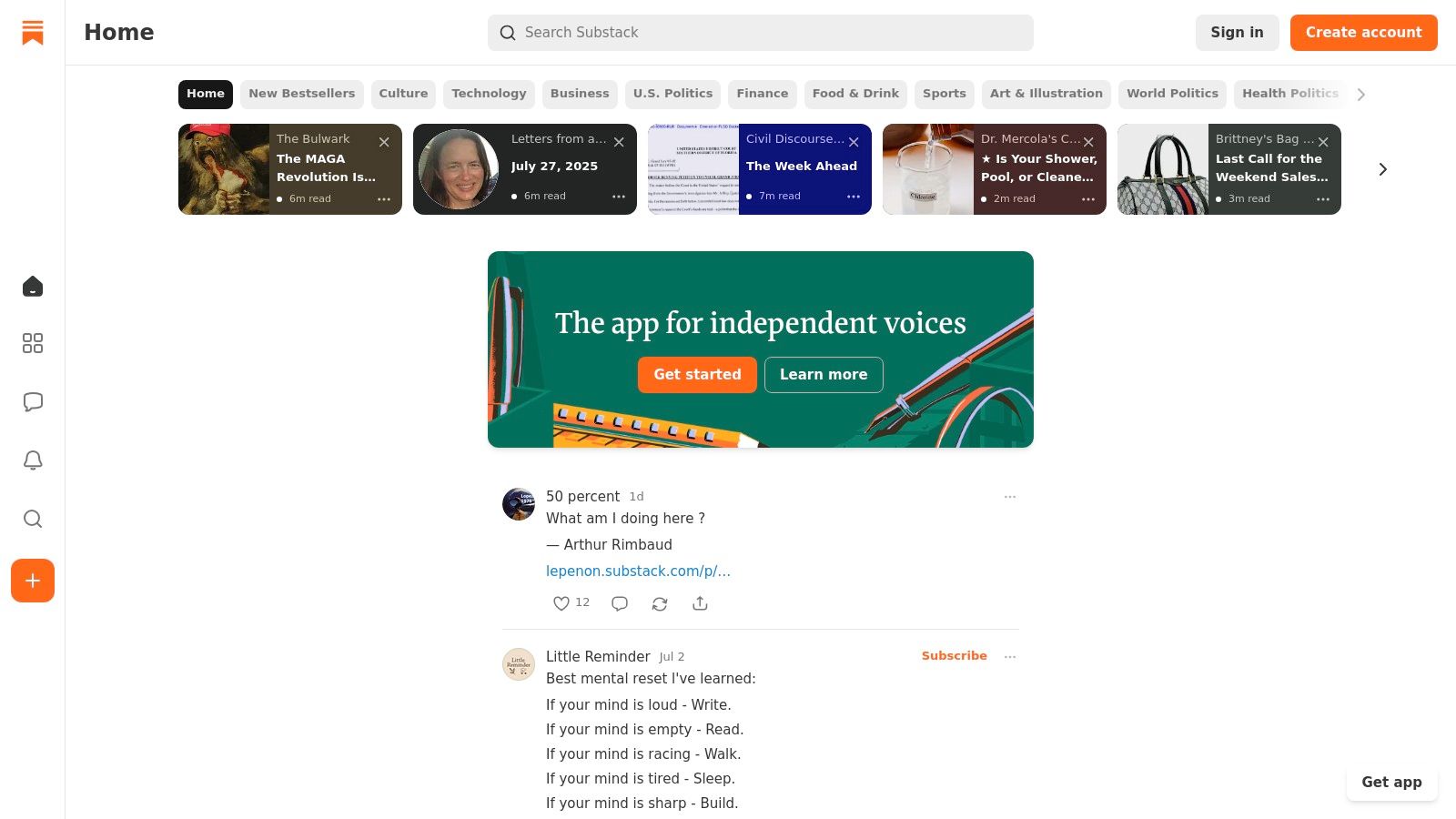
Its primary distinction is its built-in monetization model. Writers can effortlessly launch paid subscriptions, offering exclusive content to paying members while keeping other posts free. This integrated system, which includes payment processing via Stripe, makes it an ideal platform for independent journalists, niche experts, and creators aiming for sustainable income.
Platform Breakdown
| Feature | Details |
|---|---|
| Pricing | Free to publish. Substack takes a 10% commission on paid subscription revenue. |
| Key Advantage | You retain 100% ownership of your email list, a crucial asset you can take with you. |
| Ideal User | Individual writers, journalists, and subject-matter experts building a personal brand. |
| Limitation | Design customization is minimal, prioritizing content and readability over unique branding. |
Practical Tip: Leverage Substack's podcast and video hosting features to create multimedia content tiers, providing extra value for your paid subscribers and diversifying your publication.
Website: https://substack.com/
2. Ghost
Ghost positions itself as a powerful, open-source Medium alternative built for professional publishers who demand full control. Unlike hosted platforms, Ghost gives you complete ownership over your content, design, and audience data. It’s a robust content management system (CMS) specifically engineered for creating beautiful blogs, newsletters, and membership sites without creative or technical limitations.
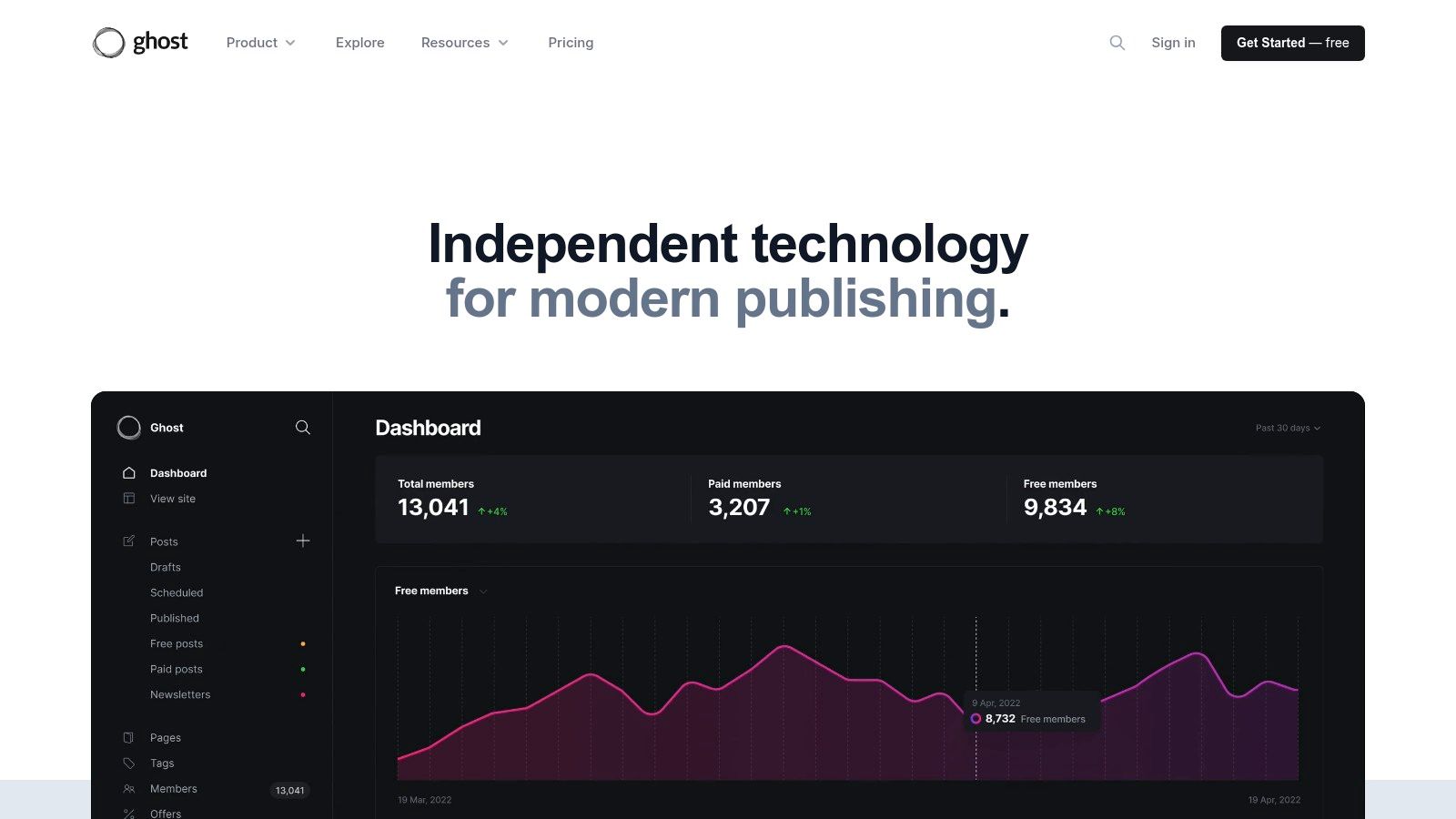
Its core advantage lies in its flexibility and performance. You can choose to self-host for ultimate control or use Ghost's managed hosting service (Ghost(Pro)) for convenience. The platform includes native tools for memberships, subscriptions, and SEO, making it a comprehensive solution for creators and businesses aiming to build a sustainable, independent publication with sophisticated monetization strategies and a unique brand identity.
Platform Breakdown
| Feature | Details |
|---|---|
| Pricing | Free (self-hosted). Paid plans for managed hosting start at $9/month. 0% transaction fees on memberships. |
| Key Advantage | Unmatched customization and full content ownership, with built-in advanced monetization and SEO features. |
| Ideal User | Professional bloggers, media companies, and businesses wanting a scalable, high-performance publishing platform. |
| Limitation | The self-hosted version requires technical knowledge to set up and maintain, creating a steeper learning curve. |
Practical Tip: Explore the Ghost Marketplace for a wide range of free and premium themes. This allows you to quickly establish a professional, unique design without needing to code it from scratch, giving your publication a competitive edge.
Website: https://ghost.org/
3. HubPages
HubPages operates as a revenue-sharing platform, making it a distinct Medium alternative for writers focused on generating passive income from their content. Instead of a subscription model, it allows authors to publish articles, or "hubs," on a wide array of topics and earn money through integrated advertising and affiliate programs. The platform is designed to attract organic search traffic, making it ideal for creating long-form, evergreen content that can accumulate earnings over time.
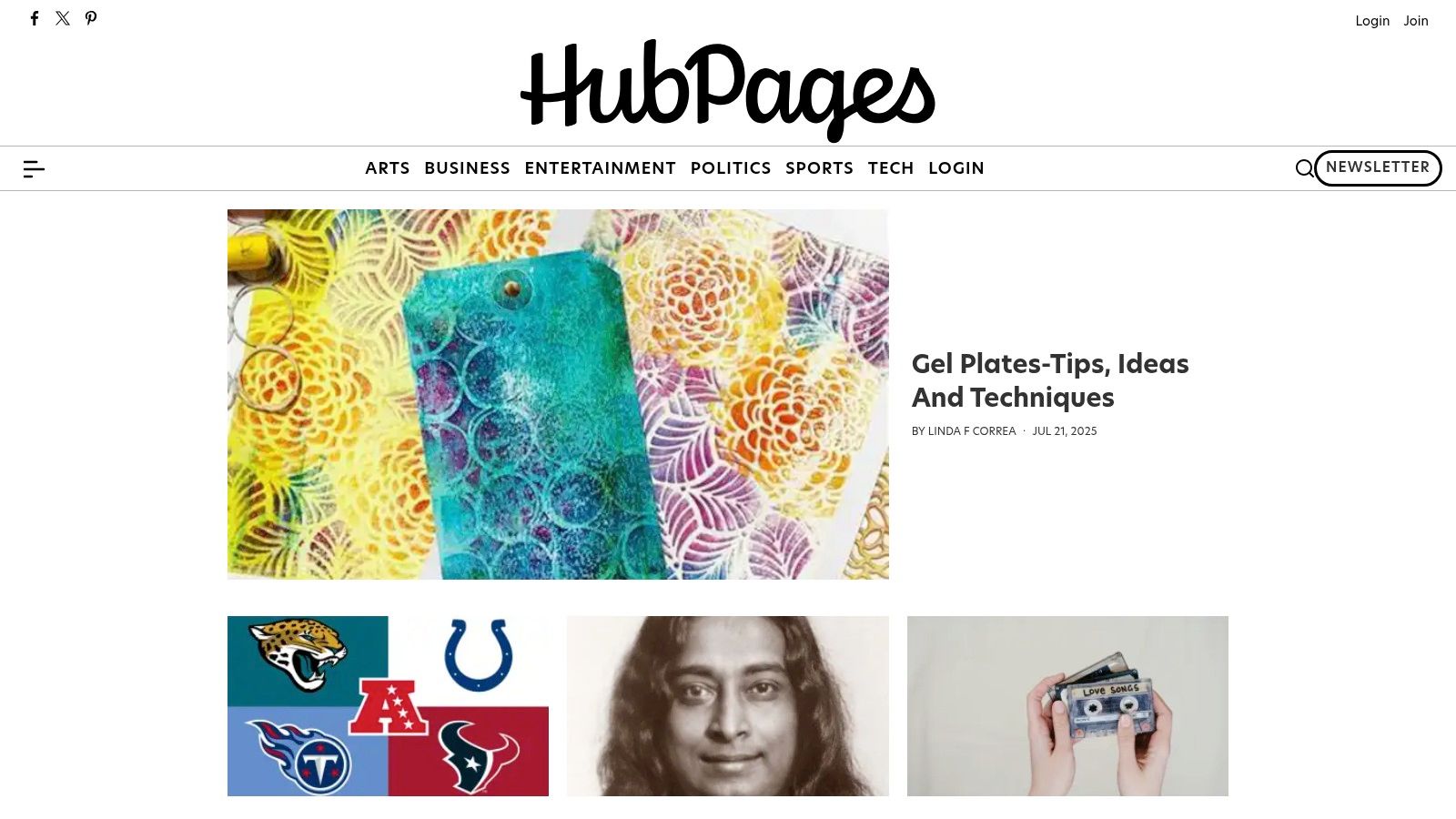
Its core uniqueness lies in its ad-based monetization and community framework. Writers benefit from a supportive network that provides feedback and guidance, while the platform handles the technical SEO aspects to help articles rank on search engines. This makes it a great starting point for those looking to monetize various types of blogs without managing their own ad networks or website infrastructure.
Platform Breakdown
| Feature | Details |
|---|---|
| Pricing | Free to publish. Revenue is earned via a 60/40 split on ad impressions (60% to the writer). |
| Key Advantage | Built-in monetization through display ads and affiliate links, requiring no upfront investment. |
| Ideal User | Hobbyist writers and niche experts aiming for long-term, passive income from evergreen articles. |
| Limitation | Earnings are highly dependent on ad performance and traffic volume, which can be inconsistent. |
Practical Tip: Focus on well-researched, SEO-optimized evergreen topics. Use tools like Google Keyword Planner to find low-competition keywords to increase your article's chances of ranking high and generating consistent organic traffic for a steady income stream.
Website: https://hubpages.com/
4. Vocal Media
Vocal Media operates as another strong Medium alternative, particularly for creative writers looking to monetize their work through multiple avenues beyond simple readership. The platform positions itself as a storytelling network where creators can publish in various topic-specific communities, from poetry and fiction to technology and personal finance. This community-based structure helps content find a relevant audience.
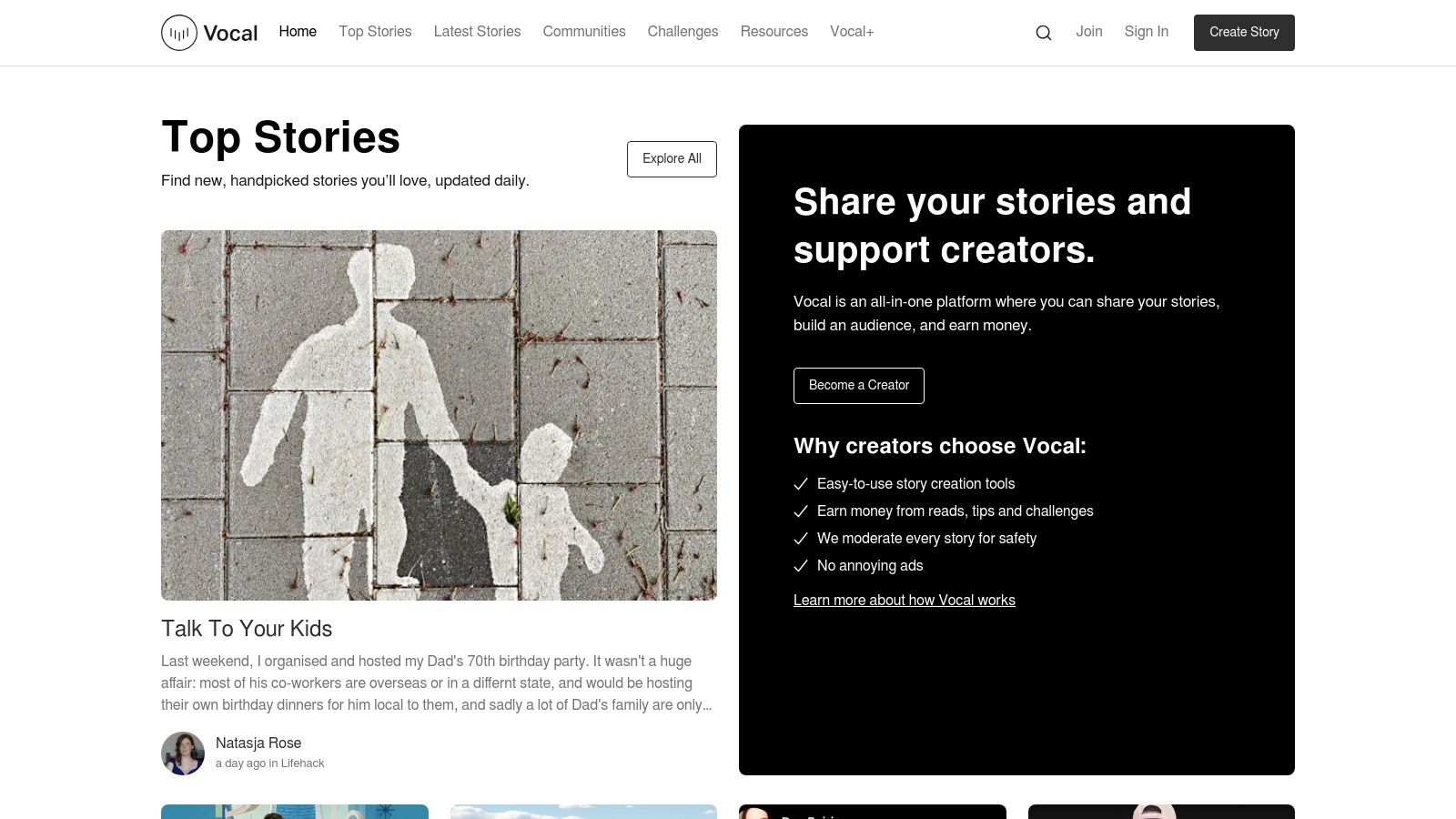
Its core distinction lies in its diverse monetization model. Writers earn money based on the number of reads their stories receive, but can also gain income through direct reader tips and by participating in regular writing challenges that offer significant cash prizes. This makes it an engaging platform for those who enjoy competitive writing and want to supplement their earnings with direct audience support.
Platform Breakdown
| Feature | Details |
|---|---|
| Pricing | Free to publish with transaction fees. Vocal+ membership ($9.99/mo) offers lower fees and higher per-read earnings. |
| Key Advantage | Multiple monetization streams including reads, tips, and cash prize challenges, diversifying income potential. |
| Ideal User | Creative writers, poets, and storytellers seeking a gamified and community-driven earning environment. |
| Limitation | Payout thresholds can be high, and building a substantial audience may be slower than on other platforms. |
Practical Tip: Actively participate in Vocal's writing challenges, even if you don't expect to win. It’s an excellent way to get your work in front of editors and a wider audience, which can boost your reads and followers.
Website: https://vocal.media/
5. LinkedIn Articles
While not a traditional blogging platform, LinkedIn Articles offers a powerful and often overlooked Medium alternative for professionals aiming to build authority within their industry. It allows you to publish long-form content directly on the world's largest professional network, placing your insights in front of colleagues, potential clients, and industry leaders. This direct integration with your professional profile makes it an unparalleled tool for thought leadership.
Its key distinction is the built-in, targeted audience. Unlike standalone blogs that require you to build an audience from scratch, your articles are immediately visible to your network and can gain traction through LinkedIn’s algorithm. This makes it ideal for B2B marketers, consultants, and executives looking to enhance their professional brand and generate inbound leads directly within a business context.
Platform Breakdown
| Feature | Details |
|---|---|
| Pricing | Completely free to use with a standard LinkedIn account. |
| Key Advantage | Direct access to a professional network, amplifying your reach within a specific industry. |
| Ideal User | B2B professionals, consultants, and executives focused on building thought leadership. |
| Limitation | Content is tied to the LinkedIn ecosystem and offers minimal design customization or monetization. |
Practical Tip: Conclude your articles with a clear call-to-action, such as inviting readers to comment with their own experiences or to follow you for more insights. This encourages engagement, which signals to the LinkedIn algorithm that your content is valuable, boosting its visibility.
Website: https://www.linkedin.com/post/new-article/
6. WordPress.com
For writers seeking ultimate control and scalability, WordPress.com presents itself as a powerful Medium alternative. Unlike more streamlined platforms, it provides a comprehensive website-building toolkit that goes far beyond simple blogging. It allows you to create a fully-featured, professional website with extensive customization options, from unique designs to advanced functionality via plugins.
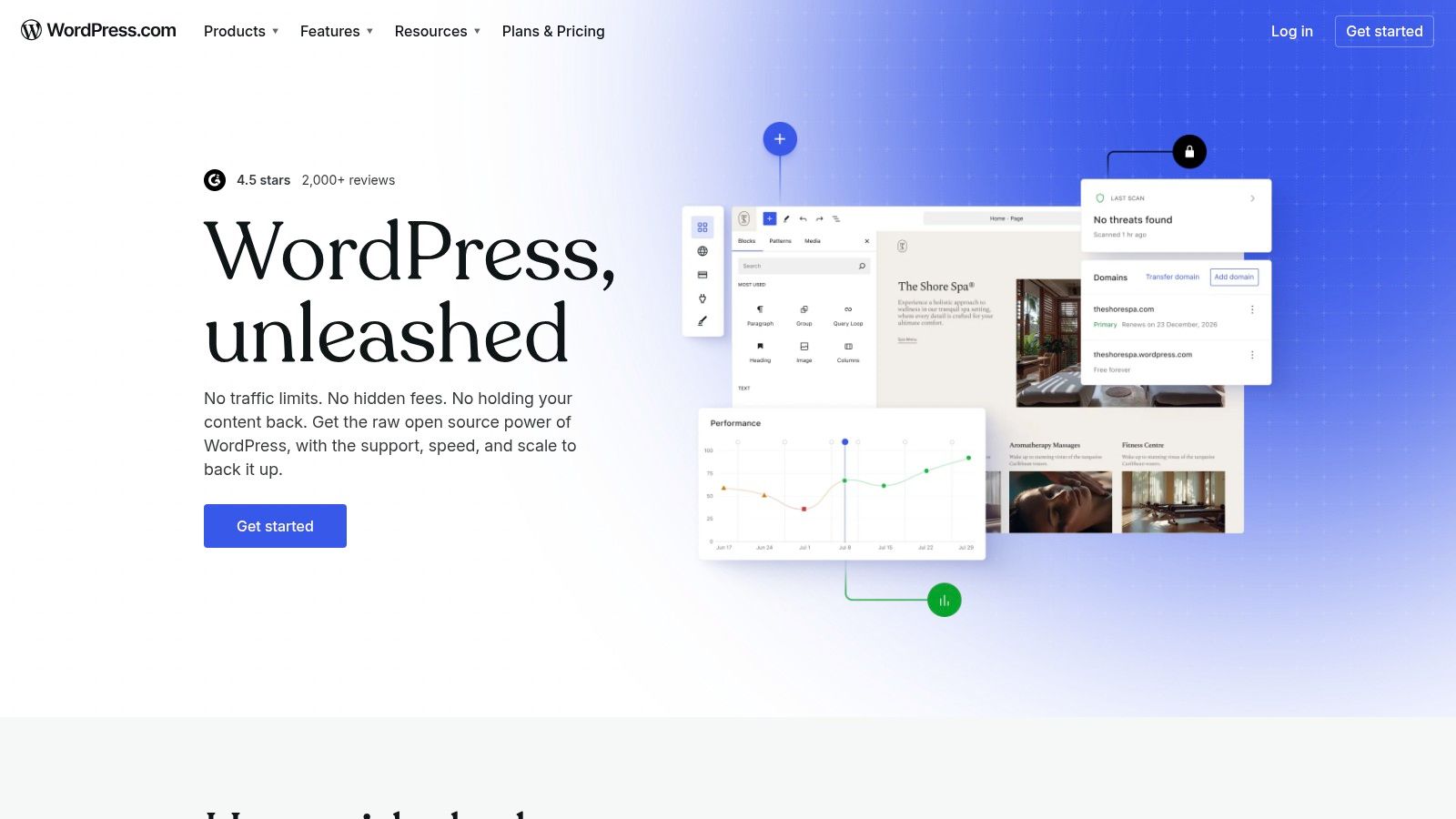
Its primary distinction lies in its unmatched versatility. You can start with a simple blog and grow it into a full-fledged publication, an e-commerce store, or a portfolio site. This scalability, combined with powerful built-in SEO tools and monetization options like ads and paid content, makes it a robust solution for creators with long-term ambitions for their brand.
Platform Breakdown
| Feature | Details |
|---|---|
| Pricing | Free plan with limitations. Paid plans unlock custom domains, plugins, and advanced tools. |
| Key Advantage | Unrivaled customization through a vast library of themes and plugins. |
| Ideal User | Bloggers and businesses wanting a highly customizable, scalable website with full ownership. |
| Limitation | Has a steeper learning curve compared to simpler platforms; many key features require a paid plan. |
Practical Tip: Start with the free or a lower-tier plan to get comfortable with the interface. As your audience and needs grow, you can upgrade to unlock advanced plugins for SEO, membership, and e-commerce, ensuring the platform scales with your success. You can explore a more detailed comparison of WordPress with other builders to see if it's the right fit for you.
Website: https://wordpress.com/
7. Blogger
As one of the original blogging platforms, Google's Blogger remains a surprisingly viable Medium alternative for those seeking simplicity and zero cost. It provides a straightforward, no-frills environment for publishing content, making it an excellent starting point for new writers or hobbyists who want to establish an online presence without any financial commitment or technical hurdles. Its direct integration with the Google ecosystem adds a layer of convenience for users already familiar with services like AdSense.
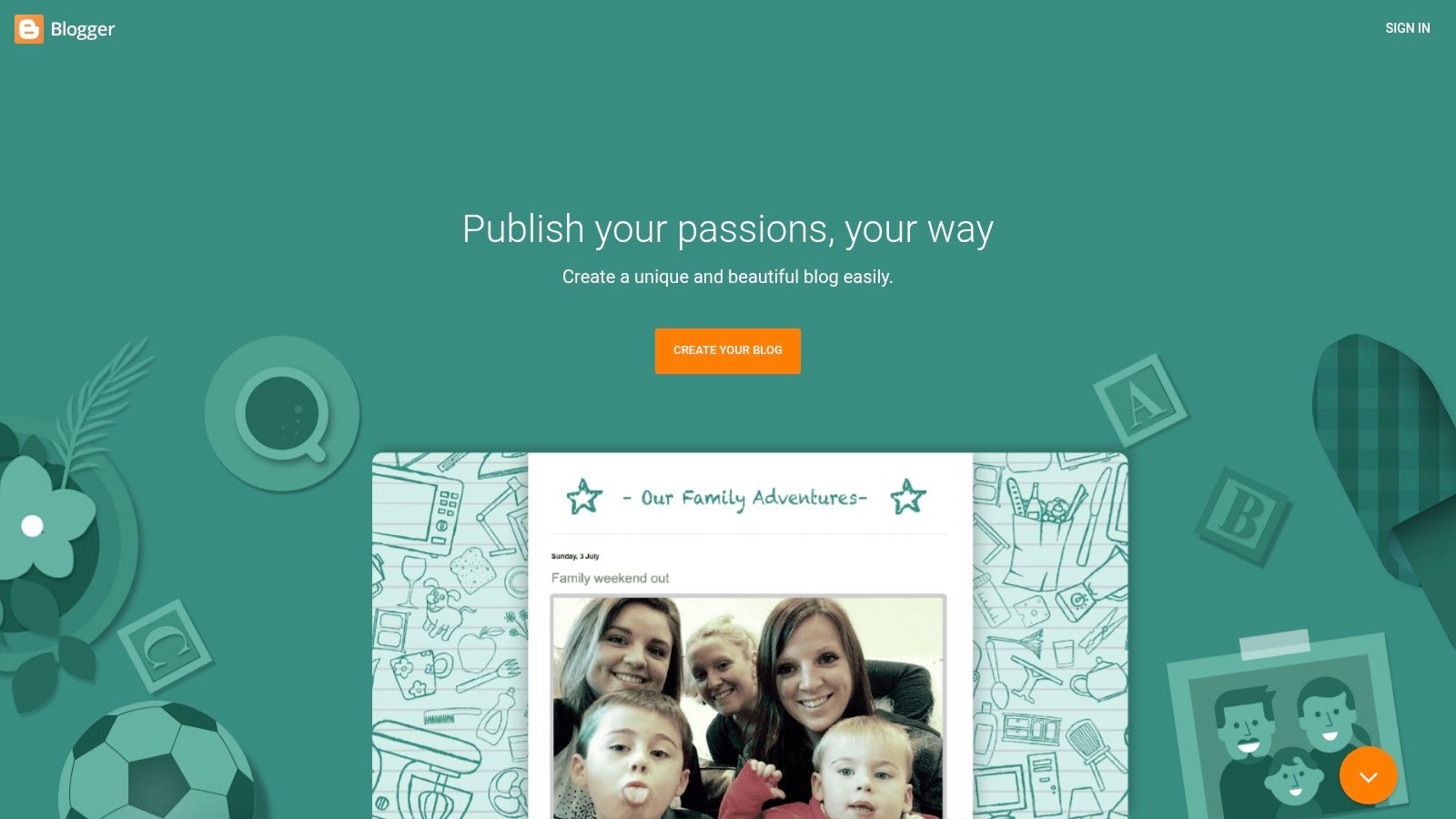
The platform's main appeal is its accessibility. You can launch a blog in minutes with a Google account, and it comes with free, reliable hosting on a blogspot.com subdomain. While it lacks the advanced monetization and community features of newer rivals, its simplicity is its strength, offering a clean canvas focused purely on content creation for those who don't need extensive functionality.
Platform Breakdown
| Feature | Details |
|---|---|
| Pricing | Completely free to use, including hosting. Monetization is possible via Google AdSense. |
| Key Advantage | Unmatched simplicity and reliability backed by Google's infrastructure, ideal for beginners. |
| Ideal User | Hobby bloggers, personal diarists, and beginners testing the waters of content creation. |
| Limitation | Features and design options are very limited; the platform receives infrequent updates. |
Practical Tip: Purchase a custom domain and connect it to your Blogger site. This small investment dramatically improves your blog's professionalism and brand identity while still benefiting from Google's free hosting.
Website: https://www.blogger.com/
8. DEV Community
For developers, programmers, and software engineers, DEV Community offers one of the most specialized Medium alternatives available. It's an open-source platform built by and for the tech community, creating an environment where technical articles, in-depth tutorials, and collaborative discussions thrive. The entire platform is geared toward sharing and consuming programming knowledge in a supportive, non-gatekept space.
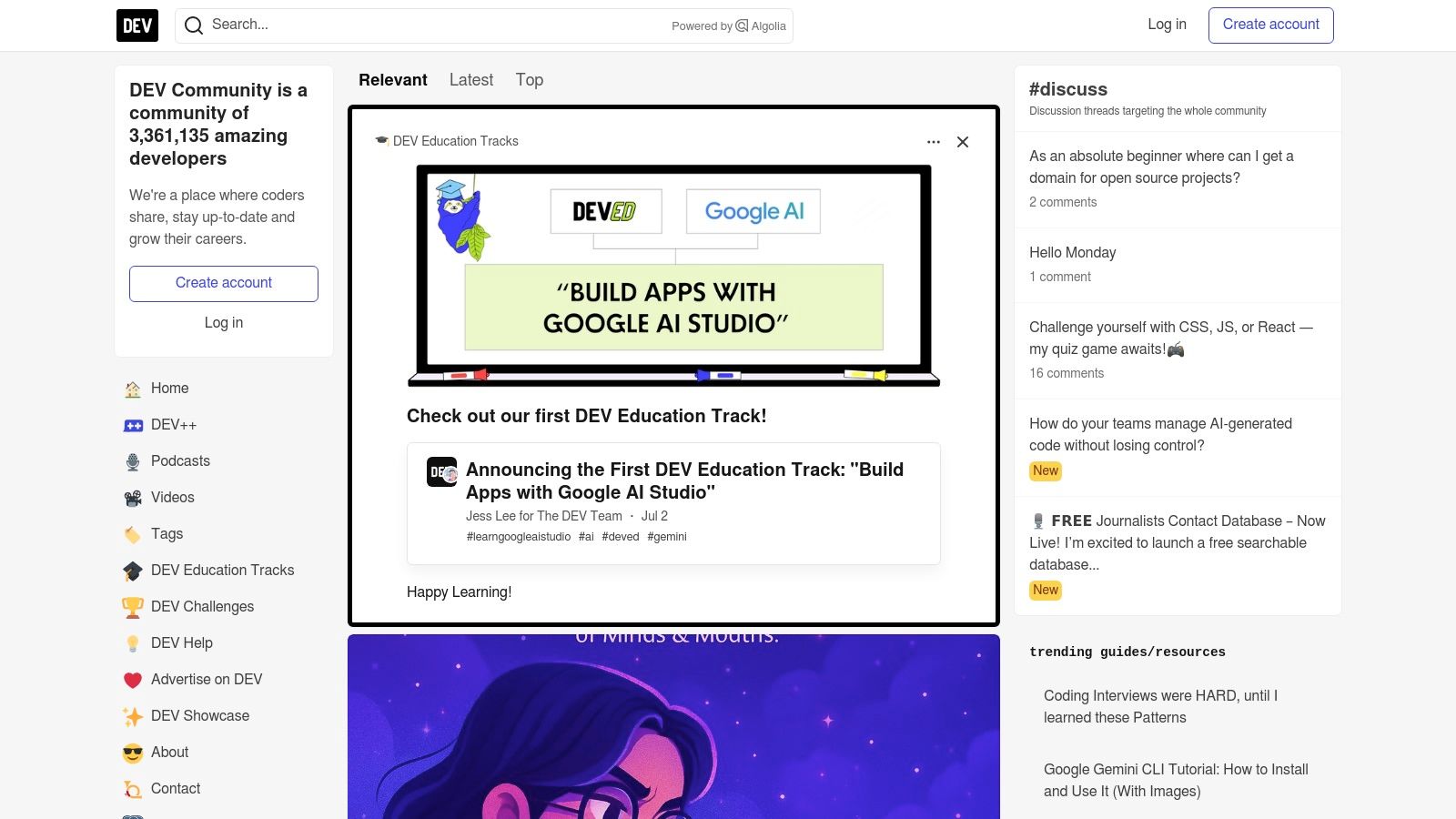
Its core distinction is its laser focus on the developer experience. The markdown editor has excellent support for code snippets with syntax highlighting, and the community-driven moderation ensures content quality remains high. It’s less about personal brand monetization and more about contributing to a collective knowledge base, making it perfect for those looking to build credibility and network within the tech industry.
Platform Breakdown
| Feature | Details |
|---|---|
| Pricing | Completely free to use for both reading and publishing content. |
| Key Advantage | A highly engaged, built-in audience of developers actively seeking technical content. |
| Ideal User | Software developers, data scientists, and tech professionals sharing tutorials or case studies. |
| Limitation | Its niche focus makes it unsuitable for writers covering non-technical topics. |
Practical Tip: Use DEV Community's tagging system strategically (e.g., #javascript, #python, #webdev) to ensure your articles reach the most relevant audience. Engaging in discussions on other posts before publishing your own can also significantly boost your visibility.
Website: https://dev.to/
9. Tumblr
Tumblr operates as a dynamic microblogging platform that merges content creation with social networking, making it a unique Medium alternative for creators focused on visual storytelling and community engagement. It excels in hosting multimedia posts like images, GIFs, and short videos, which are easily shared through its distinctive "reblog" feature. This creates a viral ecosystem where content can spread rapidly across its vast network of users.
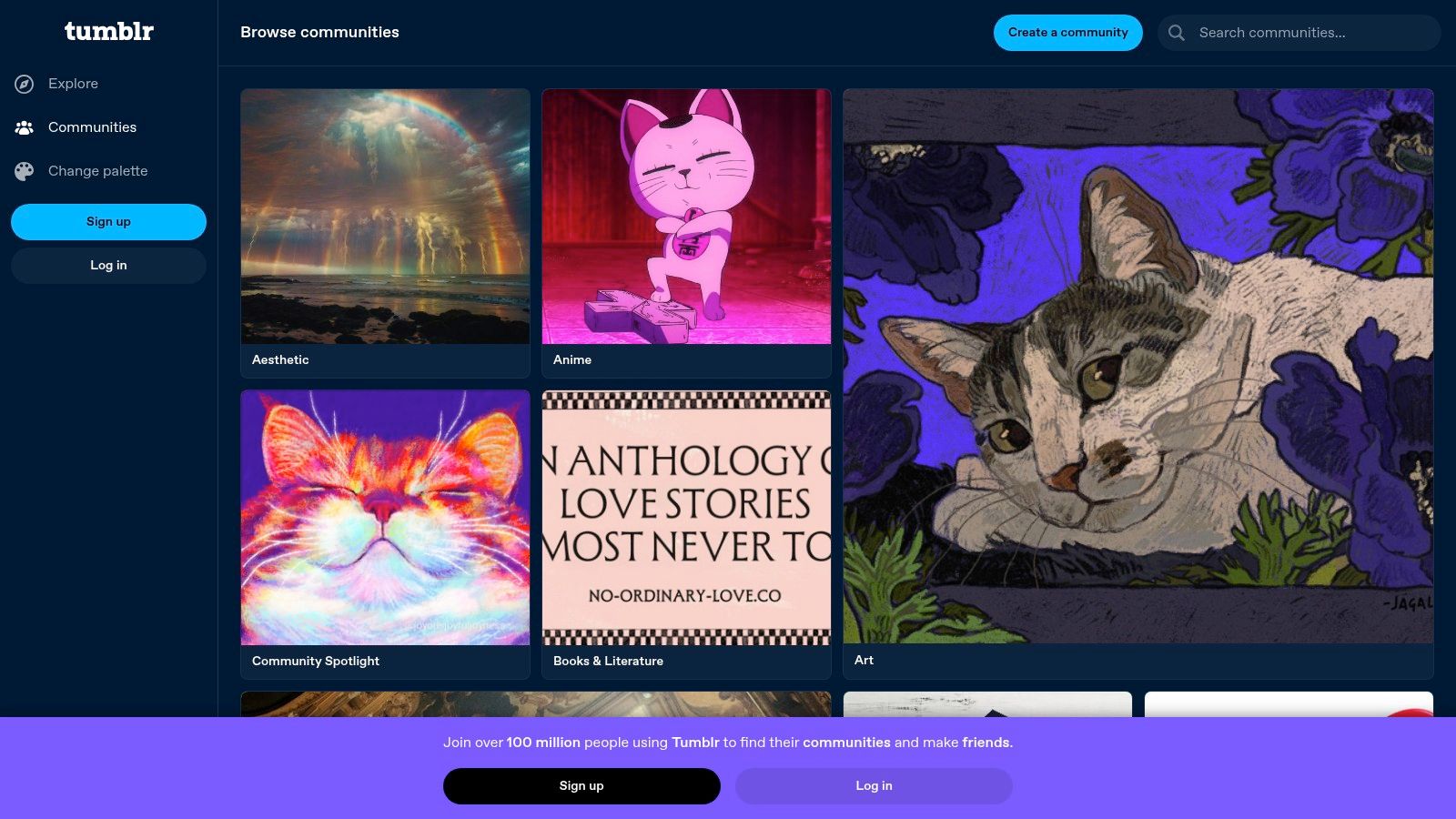
Unlike platforms geared toward long-form essays, Tumblr's strength lies in its fast-paced, highly visual, and community-driven environment. It's an ideal space for building a following around niche interests, creative portfolios, or brand aesthetics, where the focus is on shareability and interaction rather than deep-dive articles. Customization options also allow for a more personalized blog appearance.
Platform Breakdown
| Feature | Details |
|---|---|
| Pricing | Free to use. Some premium themes are available for purchase. |
| Key Advantage | High potential for content virality through its reblogging system and vibrant community. |
| Ideal User | Visual artists, photographers, meme creators, and brands targeting a younger, niche audience. |
| Limitation | Not designed for long-form content and has very limited built-in monetization options. |
Practical Tip: Use Tumblr's tagging system strategically to increase the discoverability of your posts. Research popular and relevant tags within your niche to connect with the right communities and maximize the chance of your content being reblogged.
Website: https://www.tumblr.com/
10. Write.as
Write.as strips away the noise, offering a truly minimalist and privacy-focused Medium alternatives for writers who value simplicity and anonymity. It provides a clean, distraction-free interface built for one purpose: writing. With robust support for Markdown formatting, it allows you to concentrate on your words without being bogged down by complex editors or social media metrics.
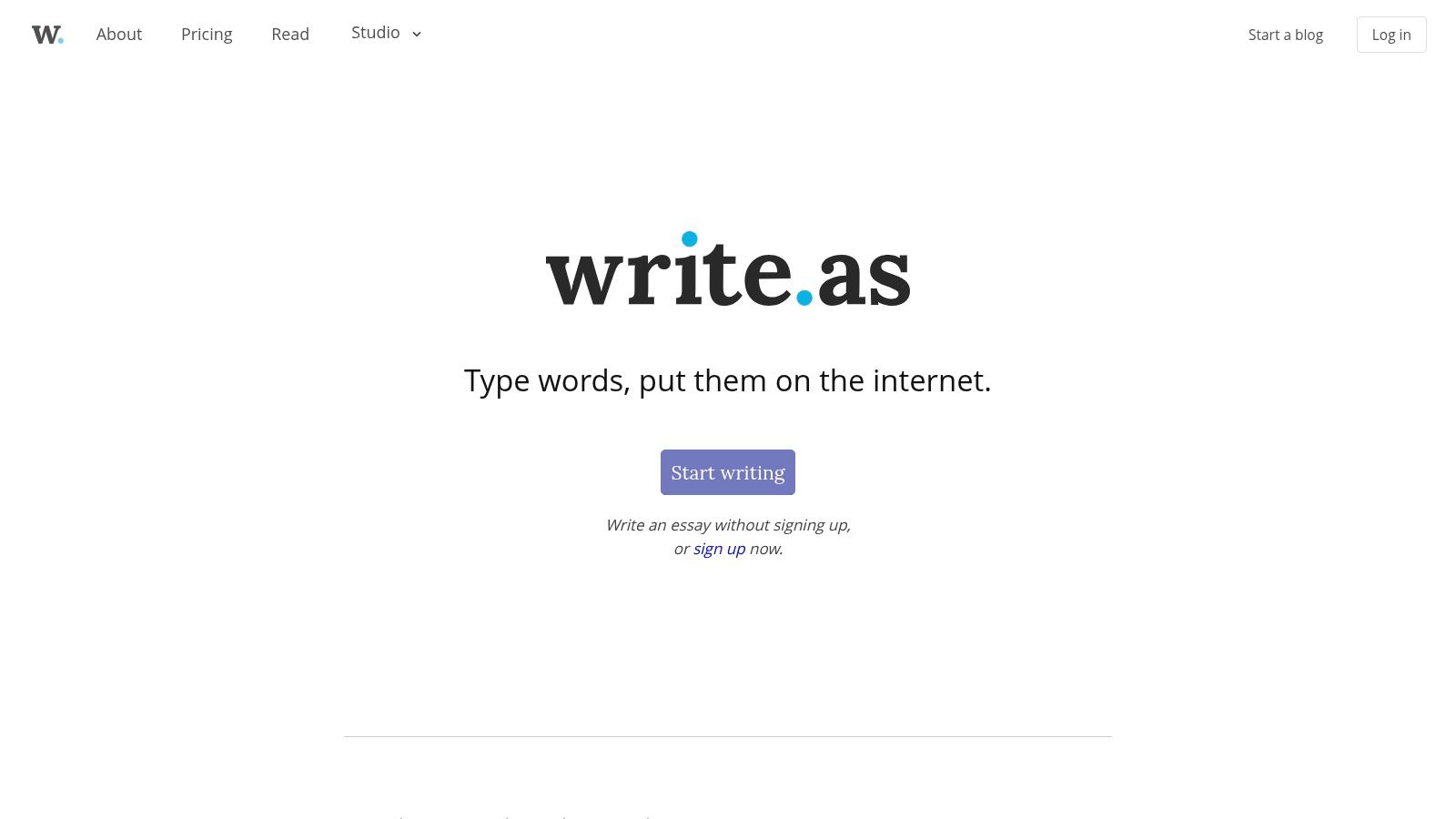
The platform's core distinction is its staunch commitment to privacy. You can publish completely anonymously without creating an account, and the entire platform is free of ads and trackers. This makes it an ideal choice for personal journaling, drafting ideas, or publishing thoughts you want to share with the world without attaching your identity. It is less a community-building tool and more a personal digital notebook.
Platform Breakdown
| Feature | Details |
|---|---|
| Pricing | Free for basic publishing. Pro plan starts at $6/month for features like custom domains. |
| Key Advantage | Unparalleled focus on privacy and anonymity, with no ads, tracking, or required accounts. |
| Ideal User | Journal writers, developers, and individuals seeking a simple, fast, and private publishing space. |
| Limitation | Very limited monetization features and almost no built-in discovery or community engagement tools. |
Practical Tip: Use the Write.as API to integrate your writing into other applications or automate your publishing workflow. It's a surprisingly powerful feature for such a minimalist platform, perfect for developers or tech-savvy writers.
Website: https://write.as/
11. Notion
Notion is an unconventional but powerful Medium alternative, known as an all-in-one workspace rather than a dedicated blogging platform. Its strength lies in its unparalleled flexibility, allowing you to build and publicly share pages that function as blog posts, portfolios, or entire knowledge bases. It’s a creator's sandbox where content is constructed from versatile blocks like text, images, databases, and embeds.
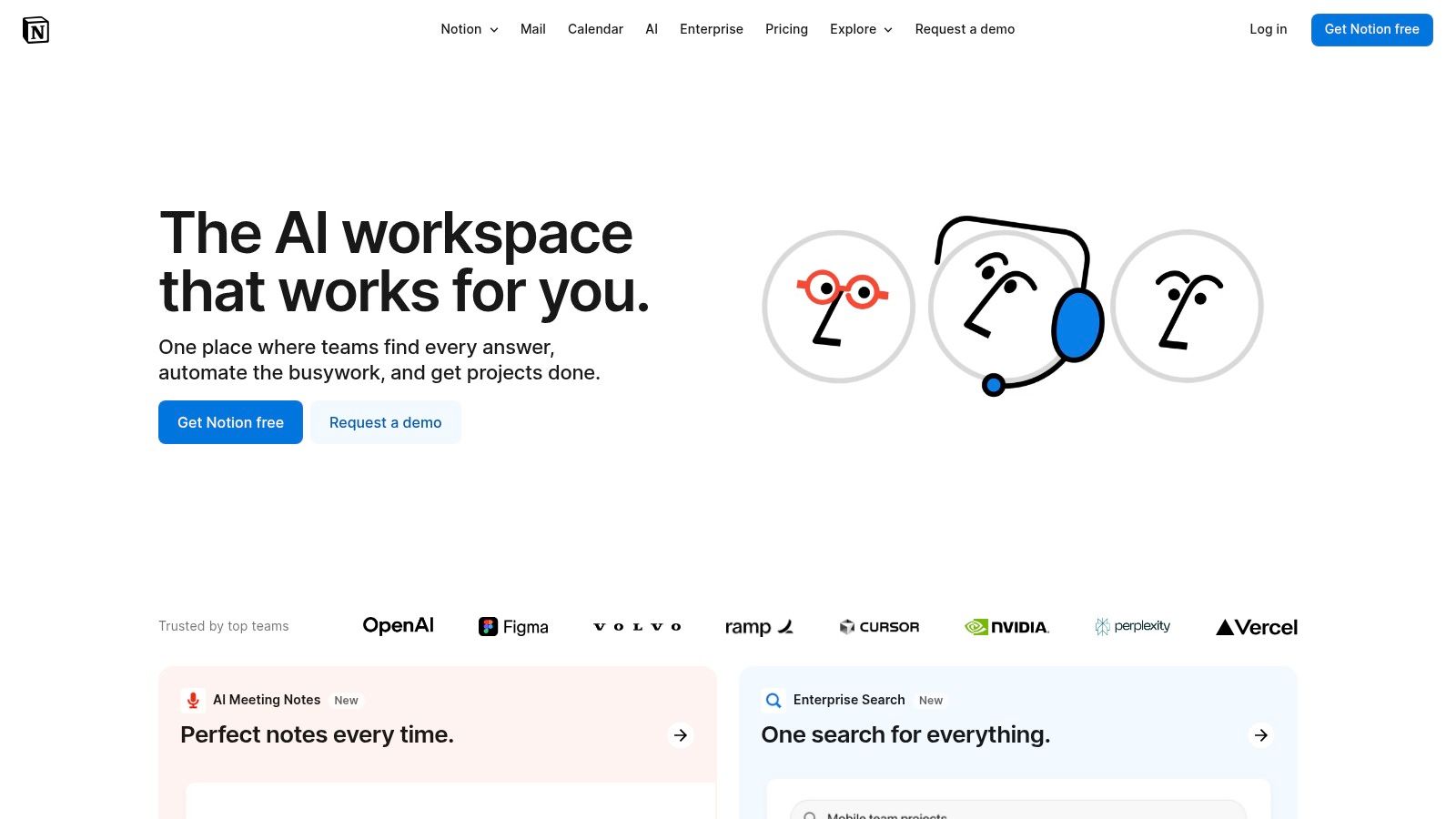
While it doesn't offer native monetization or the community features of dedicated platforms, Notion excels for those who already use it for planning and organization. You can write, manage, and publish from a single app, creating a seamless workflow. By simply making a page public, you have a live, shareable article with a customizable URL, making it perfect for technical documentation, free resources, or personal blogs where ultimate control is prioritized over discoverability.
Platform Breakdown
| Feature | Details |
|---|---|
| Pricing | A generous free plan is available. Paid plans start at $8/user/month (billed annually) for more advanced features. |
| Key Advantage | Unmatched versatility to structure content exactly how you envision, far beyond a traditional post format. |
| Ideal User | Tech writers, developers, and creators who want to integrate their writing directly with their personal or team workspace. |
| Limitation | Lacks built-in SEO tools, analytics, and direct monetization, requiring third-party tools for these functions. |
Practical Tip: Enhance the visual organization of your Notion articles by using dividers and callout blocks. You can create a more professional and scannable layout by learning how to use Notion separators effectively.
Website: https://www.notion.so/
12. Telegra.ph
Telegra.ph is a radically simple and anonymous publishing tool from the creators of Telegram. As a Medium alternative, its appeal lies in its absolute minimalism and speed, allowing anyone to publish a clean, well-formatted article instantly without needing an account, login, or any personal information. This makes it an outlier focused purely on the act of publishing, not on building an audience or brand.

Its primary distinction is its ephemeral and anonymous nature. Once you publish an article, you can only edit it from the same browser session where it was created, as there is no user account to tie it to. This approach is ideal for quick announcements, one-off posts, or situations where privacy and speed are paramount over author recognition and long-term content management.
Platform Breakdown
| Feature | Details |
|---|---|
| Pricing | Completely free to use with no hidden costs or features. |
| Key Advantage | True anonymous publishing; no registration or personal data is required to create content. |
| Ideal User | Individuals needing to quickly share information, activists, or anyone prioritizing privacy. |
| Limitation | No monetization, analytics, or author profiles, and content can be hard to edit after publishing. |
Practical Tip: Use Telegra.ph for creating quick, shareable change logs, event details, or supplementary content for social media posts where a full blog post is overkill. The simplicity ensures your message is delivered without distraction.
Website: https://telegra.ph/
Medium Alternatives Feature Comparison
| Platform | Core Features ✨ | User Experience ★★★★☆ | Value Proposition 💰 | Target Audience 👥 | Unique Selling Points 🏆 | Price Points 💰 |
|---|---|---|---|---|---|---|
| Substack | Email distribution, payment processing, analytics, multimedia support | Easy setup, intuitive interface | Monetize via subscriptions, full list ownership | Independent writers & podcasters | Built-in payments, list ownership | 10% commission on revenue 💰 |
| Ghost | Customizable themes, SEO, memberships, integrations | Fast, customizable, requires tech skill | Full content control, flexible monetization | Professional publishers, bloggers | Open-source, performance optimized | Self-hosted/free to $29+/mo 💰 |
| HubPages | Ad revenue sharing, SEO-friendly, community | Simple publishing, community support | Passive income through ads | Content creators focused on evergreen topics | Ad & affiliate revenue, no upfront cost | Free |
| Vocal Media | Earnings per read, tipping, contests, categories | User-friendly, content variety | Monetize through engagement and tips | Creative writers seeking cash rewards | Writing challenges & reader tips | Free |
| LinkedIn Articles | Professional network access, SEO, analytics | Easy for LinkedIn users | Increase professional visibility | Professionals & thought leaders | Professional audience, no cost | Free |
| WordPress.com | Themes/plugins, SEO, monetization, support | Highly customizable, moderate learning curve | Versatile & scalable website creation | Bloggers, businesses, developers | Extensive plugins & community support | Free to premium plans 💰 |
| Blogger | Google integration, templates, free hosting | Simple and reliable | Free, easy blog startup | Beginner bloggers | Fully free, Google-backed | Free |
| DEV Community | Technical content, code support, open-source | Supportive, niche developer community | Networking & content sharing | Developers & tech writers | Developer-focused, open source | Free |
| Tumblr | Multimedia support, social features, themes | Easy, social, visual content focus | Social sharing & casual blogging | Visual/content sharers, microbloggers | Social tools, reblogging, free use | Free with optional themes 💰 |
| Write.as | Distraction-free, anonymous, Markdown | Minimalist, privacy-focused | Privacy & simplicity over monetization | Privacy-conscious writers | Anonymous posts, no tracking | Free & paid tiers 💰 |
| Notion | Notes, databases, public sharing, collaboration | Versatile, collaborative | All-in-one workspace, limited blog focus | Teams & individuals needing flexibility | Multi-content blocks, team use | Free to paid plans 💰 |
| Telegra.ph | No registration, minimalistic, image support | Instant, anonymous | Quick, private publishing | Anonymous & fast publishers | No account needed, extremely simple | Free |
Making Your Final Choice: A Strategic Framework
Choosing the right platform to publish your content is a pivotal decision, moving beyond the familiar interface of Medium to find a home that truly aligns with your strategic goals. We've explored a dozen distinct Medium alternatives, from newsletter-centric platforms like Substack to the powerful, self-hosted option of Ghost, and even specialized communities such as the DEV Community for tech professionals. The key takeaway is clear: there is no single "best" alternative, only the one that is best for you.
Your final decision hinges on a clear understanding of your primary objectives. The ideal platform is the one that removes friction between you and your audience while supporting your specific content strategy, whether that’s building an e-commerce empire, a thriving digital publication, or a simple, elegant personal blog.
A Framework for Your Decision
To navigate this choice effectively, consider these critical factors. This isn't just about features; it's about finding the operational fit for your business or personal brand.
-
Monetization vs. Community: Are you focused on direct revenue through subscriptions and paywalls? Substack and Ghost are purpose-built for this. Or is your goal to build a following and engage with a like-minded community? In that case, Vocal Media or LinkedIn Articles might offer a more organic path to visibility.
-
Technical Control vs. Simplicity: How much control do you need? For organizations requiring custom integrations, advanced SEO, and unique branding, a self-hosted WordPress or Ghost installation offers unparalleled flexibility. Conversely, if you want to publish instantly with zero technical overhead, platforms like Telegra.ph, Blogger, or Write.as provide the ultimate in plug-and-play simplicity.
-
Niche Focus vs. Broad Appeal: Consider your target audience. A tech-focused startup will find an immediate, receptive audience on the DEV Community. A business professional or an Omaha-based company looking to establish thought leadership will benefit from the professional network on LinkedIn. Broad-appeal platforms like WordPress.com cater to everyone but require more effort to find your niche.
Ultimately, selecting from the many available Medium alternatives is an exercise in strategic alignment. Map your goals to the strengths and weaknesses we've outlined for each option. A small business might start with LinkedIn Articles to build authority before migrating to a self-hosted Ghost site for greater monetization control. An artist might prefer the visual-first approach of Tumblr over the text-heavy focus of Substack. As you navigate your publishing journey, challenges like creative hurdles may arise. For proven tips and tricks to help you, discover how to overcome writer's block and maintain consistent output.
Your content deserves a platform that amplifies its value. By carefully weighing these considerations, you can confidently choose a digital home that not only hosts your words but actively helps you achieve your long-term goals.
Ready to move beyond simple blogging and build a powerful, conversion-optimized web application for your content? The experts at Up North Media specialize in custom web development that integrates content, commerce, and community seamlessly. Partner with Up North Media to create a platform that scales with your ambition.
